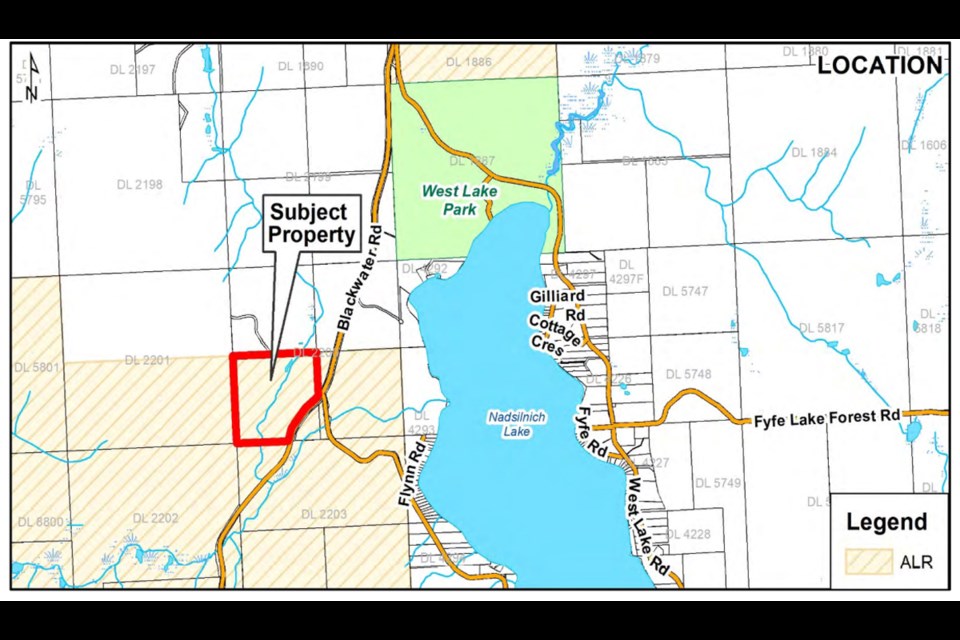The Regional District of Fraser-Fort George board of directors approved a pair rezonings to facilitate proposed cannabis growing operations near Prince George on Thursday.
One proposal is located at 22415 and 22425 Blackwater Rd., near West Lake Park, and the other is at 10495 Horseshoe Dr. east of Pineview. Both projects received opposition from concerned neighbours, however the Horseshoe Drive proposal also received significant support from area residents as well.
The board voted 10 to four in favour of the rezoning for the Blackwater Road facility. Directors Lara Beckett, Art Kaehn, Joan Atkinson and Allan Frederick opposed the rezoning.
“I’ve given a lot of thought to this application. From an agricultural product point of view, if it was soil-based on not inside it wouldn’t even be in front of us,” Beckett said. “There is clearly from the community a lot of concerns about this proposal. I’m also concerned about the intent to lease the operation to a third party.”
The board unanimously approved the rezoning on Horseshoe Drive without debate.
WEST LAKE NEIGHBOURS OPPOSED
The proponents of the Blackwater Road proposal rezoned their 56.43 ha (139.44 acre) property to allow cannabis production on up to four hectares of the site. Under regional district bylaws, cannabis production is normally only allowed on properties 259 ha. in size or larger.
During a public hearing on March 22, landowner Daron Miller said he and his young family live on the proposed site, according to a report that went to the district board on Thursday.
Miller said he is looking to build a two-storey, 6,400 sq. foot building which would be leased out to cannabis producers. The operation would employ a maximum of six people, and would have strong security measures and an odour control system.
In a letter submitted to the regional district, Miller said his home is 650 metres from the proposed site and the next nearest home is more than a kilometre away.
“Being the property owner, but also raising my family on this property, means that my wife and I are the most invested and aware of the issues that may arise from poor property management and construction,” Miller wrote. “However, with good property management and professional trades involved in building design and construction, none of these concerns will affect the wellbeing of the West Lake Community or my own family.”
During the public hearing, J.P. Asquith – the vice-chair for Scouts Canada for Camp Hughes – made a presentation opposing the proposal because of the closeness to Camp Hughes.
Five other area residents wrote letters opposing the proposed rezoning, most were concerned about odours, potential crime, potential reduced property values and increased traffic on the road.
“We have driven by cannibas plants in other communities and to be blunt and honest, they stink!” Rob and DaVerne Wood wrote. “If this amendment is accepted, it sets a precedent for other property owners with smaller acreage to request an amendment for cannabis facilities as well – or any other facility.”
In an email, Keith Monroe wrote that the Miller are good neighbours, but the facility would be rented out and that was cause for concern.
“I would like to start off this letter with a sincere apology to the good people of the West Lake Community and surrounding areas, as it was my mother… who sold this land to the project applicants several years back,” Glenn Howe wrote. “Had this type of development plan been disclosed to us, we never would have sold the property.”
HORSESHOE DRIVE PROPOSAL RAISES SUPPORT, CONCERNS
Allan and Berry Work are looking to establish a cannabis growing operation on a 4.48 ha. (11 acre) parcel of land on Horseshoe Drive. The Works intend to convert an existing barn on the centre of the property for cannabis production, according to a district staff report to the board on Thursday.
In a letter to the district, Barry Work said he has grown medical cannabis for 15 years, and is looking to expand and obtain a craft cannabis licence.
“I take pride in my plants, and strive to produce a clean, safe, good tasting product,” Work wrote. “For the past 15 years, the building where I propose to hold a craft licence has had a medical licencing permit. To avoid any odours, respect my neighbours, and ensure my safety, I use a charcoal filtering system.”
Work submitted a petition with more than 50 names in support and two against the proposal. In addition, three of the closest neighbours to the site appeared at a public hearing on March 17 to speak in support of Work’s proposal.
However, not all residents in the area were in favour of the proposal.
In a letter to the district, Pero Mocilac raised concerns about smell, air quality and the potential impact of water consumption on the local water table.
David Daoust and Wendy Pelletier also raised concerns about water consumption in a letter to the district.
“The reason for this concern is due to several wells along Horseshoe Drive properties going dry. Ours did several years ago and we had to drill another well,” Daoust and Pelletier wrote. “The neighbour across the road from us just had his well go dry last month. It does appear that our water table could be compromised.”
In addition, they said the Alpine Ranches Subdivision has restrictive covenants preventing livestock and poultry from being raised commercially in the area.
“While it does not mention specifically a Cannabis Production (facility), our point is that Alpine Ranches Subdivision was designed for hobby farms, not for commercial farming operations,” they wrote.
Resident Tim Giesbrecht wrote that he is “deeply concerned” about the proposal’s impact on the neighbourhood, and potential for crime and odours.
“I believe that the current minimum site area for cannabis production use was set at 259.9 ha. for good reason: to allow for large undeveloped areas to be utilized outside of a residential setting,” Giesbrecht wrote.



